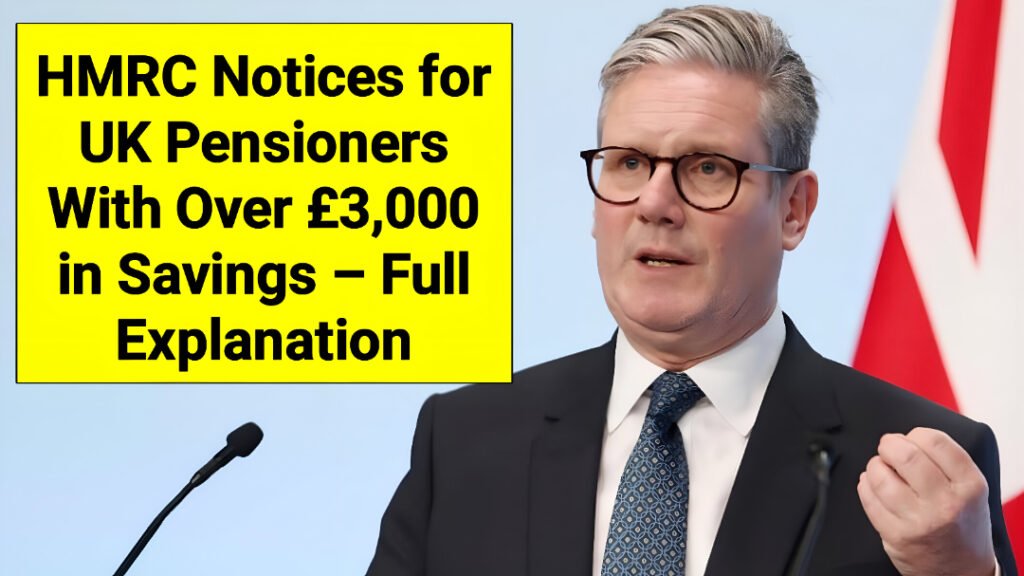HMRC Notices for UK Pensioners With Over £3,000 in Savings: For UK pensioners, understanding HMRC rules is crucial because savings and income can directly impact how much tax needs to be paid. Recently, pensioners with over £3,000 in savings have started receiving notices from HMRC regarding their financial status. These notices are not penalties but reminders to ensure pensioners are declaring income correctly and paying any tax owed.
What Triggers an HMRC Notice for Pensioners
The main reason pensioners receive notices is when HMRC identifies that their total income, including pensions, state benefits, and savings interest, may exceed the tax-free allowance. Having more than £3,000 in savings can generate interest that needs to be declared. If this interest, combined with other income, is not correctly reported, HMRC may send out a notice for clarification.
The Role of the Personal Savings Allowance
The UK has a Personal Savings Allowance (PSA), which allows most pensioners to earn some interest on savings without paying tax. For basic-rate taxpayers, this allowance is £1,000, while for higher-rate taxpayers, it is £500. If your savings interest stays within this limit, no tax is due. However, if it goes above the allowance, HMRC will expect you to declare it, and this is often when notices are issued.
How HMRC Tracks Pensioners’ Savings
HMRC uses data provided by banks, building societies, and investment firms to track how much interest individuals earn on their savings. This means even if a pensioner forgets to declare savings income, HMRC may already have the information. The notice serves as a formal reminder that pensioners must check their accounts and update their tax returns if necessary.
What Pensioners Should Do After Receiving a Notice
If you receive an HMRC notice, it is important not to panic. The first step is to carefully read the notice and understand why it was sent. Pensioners should gather bank statements, pension income details, and any other relevant documents. If the savings interest exceeds the allowance, then declaring it promptly will resolve the issue. HMRC also provides online tools and helplines to guide pensioners through the process.
Common Mistakes Pensioners Make with Savings and Tax
One of the most common mistakes is assuming that all savings are tax-free after retirement. While the state pension itself is taxable, it is often paid without tax deductions, which can create confusion. Another mistake is forgetting small savings accounts that still generate interest. Even small amounts across multiple accounts can add up and push pensioners above the tax-free allowance.
Penalties for Not Responding to HMRC Notices
Ignoring an HMRC notice can lead to unnecessary complications. If pensioners do not respond in time, they may face late penalties or additional interest charges. While HMRC usually offers flexibility for genuine mistakes, repeated failure to declare savings income could result in financial penalties. It is always best to respond promptly and seek advice if needed.
How Pensioners Can Reduce Tax on Savings
There are several legal ways pensioners can reduce the amount of tax owed on savings. Using ISAs (Individual Savings Accounts) is one of the most effective, as all interest earned in an ISA is tax-free. Pensioners can also consider splitting savings between spouses, making the most of both partners’ tax allowances. Additionally, keeping track of the Personal Savings Allowance ensures that interest earned stays within limits.
Impact on Pension Credit and Other Benefits
It is also important to note that having more than £3,000 in savings can affect means-tested benefits such as Pension Credit. HMRC notices sometimes overlap with Department for Work and Pensions (DWP) checks to confirm eligibility for certain benefits. Pensioners should be aware that declaring savings accurately not only keeps HMRC satisfied but also prevents overpayments or reductions in other benefits.
Expert Advice for Pensioners Receiving HMRC Notices
Financial experts recommend that pensioners regularly review their savings and income to avoid surprises. Keeping detailed records, using online tax calculators, and consulting professional advisors can make the process smoother. Charities like Age UK and Citizens Advice also provide free support to help pensioners understand and respond to HMRC notices effectively.
Future of HMRC Rules for Pensioners
As the government looks to close tax gaps and ensure fairness, pensioners can expect HMRC to continue monitoring savings closely. The use of digital systems and data-sharing between banks and HMRC will make it harder to overlook undeclared income. Staying informed and proactive is the best way to avoid unexpected notices in the future.
Conclusion
The rise in HMRC notices for pensioners with over £3,000 in savings is a reminder of how important it is to declare all sources of income, even after retirement. While the notices may seem worrying, they are usually just prompts to update records and pay any small tax due. By understanding allowances, responding quickly, and managing savings smartly, pensioners can stay compliant and stress-free.
